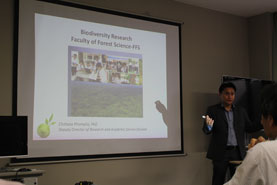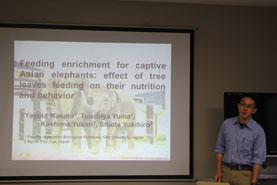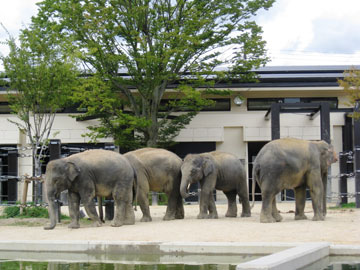Asura International Seminar
June 30, 2017. 10:00-12:00
Seminar room, Wildlife Research Center of Kyoto University




Dr. Chittana Phompila
Deputy Director of Research and Academic Service Division,Faculty of Forest Science (FFS), National University of Laos (NUoL)An Overview of Biodiversity Research at Faculty of Forest Science, National University of Laos

This talk will present audiences about an overview of the Faculty of Forest Science (FFS), National University of Laos (NUoL) and its currently implemented biodiversity research. Numbers of FFS student has been increased over time since 1973 and development of new course were introduced in each period from the beginning such as BSc, MSc and PhD. There are various aspects of expertise of FFS staff who obtained qualifications from different high reputation overseas universities. This expertise includes natural resource and environmental management (including REDD+), watershed and land use planning, forest economics and wood technology, botany, forest ecology, community-based forest and rural development, remote sensing and GIS and etc. Some facilities have been under development to supports research such as GIS and remote sensing lab, wood property testing and experience lab, nursery and forestry training center. There are a wide range of biodiversity research has been attempted to implement aligning to five major syllabuses and a climate change research center. These research focus on wood technology, watershed management and land use planning, forest research management, ecotourism, forest based community and rural development, and climate change, especially REDD+. Some good quality of research paper has been openly published. Financial support is a main barrier for FFS to undertake research, although some small research fund available. The FFS has therefore tried to promote a strong collaboration with international institutions to exchange and carry out forest science research and seek for national and international corporations.

Dr. Masato Yayota
Professor, Faculty of Applied Biological Sciences, Gifu University, JapanFeeding enrichment for captive Asian elephants: effect of tree leaves feeding on their nutrition and behavior

The current feeding program for captive Asian elephants is designed according to the feeding program for domestic horses. Although this feeding program has worked reasonably, elephants and horses have different feed digestibility and passage rate in their digestive tracts. Moreover, many captive elephants are rather overweight in Japanese Zoos. Thus, specific feeding program for captive Asian elephants is required to conduct appropriate nutritional management. Generally, wild Asian elephants eat relatively large amount of tree leaves, and keepers in Laos ,who has sufficient knowledge and experience for feeding elephants, provide tree leaves (or bamboos) to their animals. This feeding habit of elephants or feeding regimen in Loas implies that eating tree leaves has a positive effect on elephant's nutrition. Therefore, we introduced tree leaves feeding into the current feeding program, and aim to clarify the effect of this feeding program on nutritional status of the elephants.